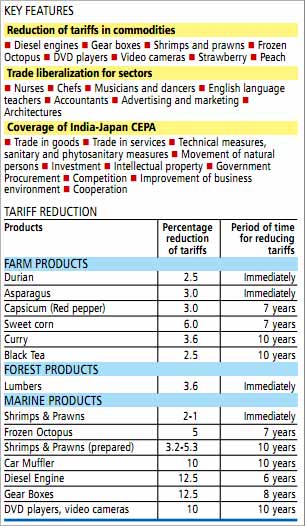 | « Back to article | Print this article |
 India and Japan have set a target of achieving $25 billion worth of bilateral trade by 2014 from the present $10.3 billion even as both countries have signed the much-awaited Comprehensive Economic Partnership Agreement that will see about 94 per cent tariff reduction in goods ranging from cars to shrimps and easier movement of nurses and chefs.
India and Japan have set a target of achieving $25 billion worth of bilateral trade by 2014 from the present $10.3 billion even as both countries have signed the much-awaited Comprehensive Economic Partnership Agreement that will see about 94 per cent tariff reduction in goods ranging from cars to shrimps and easier movement of nurses and chefs.
The deal was signed between Commerce and Industry Minister Anand Sharma and Japanese Foreign Minister Seiji Maehara in Tokyo.
It was formally agreed upon by Prime Minister Manmohan Singh and his Japanese counterpart Naoto Kan last year in October.
"India stands to gain significantly through this agreement and 90 per cent of tariff lines are covered while Japan has covered 5 per cent more lines than India.
"The agreement has ensured that the sensitive sectors for India are fully protected.
"These include agriculture, fruits, spices, wheat, basmati rice, edible oils, wines and spirits and also certain categories of industrial products such as auto and auto parts," said an official statement by the ministry of commerce and industry.
On a trade value basis, while Japan has agreed to 97 per cent tariff reduction in trade in goods, India has consented for 90 per cent duty abolition, according to the Embassy of Japan's communiqué.
The number of Japanese firms in India has doubled in last three years taking the total investments from Japan to India to more than 800 billion Yen, according to Japanese official data.
However, as a result of this deal companies from both countries such as Mitsubishi Religare Enterprises Ltd, Heavy Industries, Toshiba, Dai-Ichi, JSW, Hitachi, L&T, NTPC, Panasonic, Sony and Marubeni India Pvt would stand to gain.
Besides getting a liberal access to Japan's $5 trillion economy, India would also now be able to access the Japanese pharmaceutical sector while imports of petrochemicals, chemicals, textile, readymade garments, cement and jewellery would be cheaper.
Japan has also agreed to give same treatment to the Indian generics in line with its domestic pharmaceutical industry.
On several farm products, forest items and marine products such as lumbers, shrimps and prawns, durian and asparagus, there would 3-6 per cent tariff reduction immediately after the agreement comes into force by April 1.
In other agriculture and marine commodities such as black tea, frozen octopus, capsicum, curry and sweet corn, Chinese yam, peach and strawberries, tariffs would be gradually reduced in the next 7-10